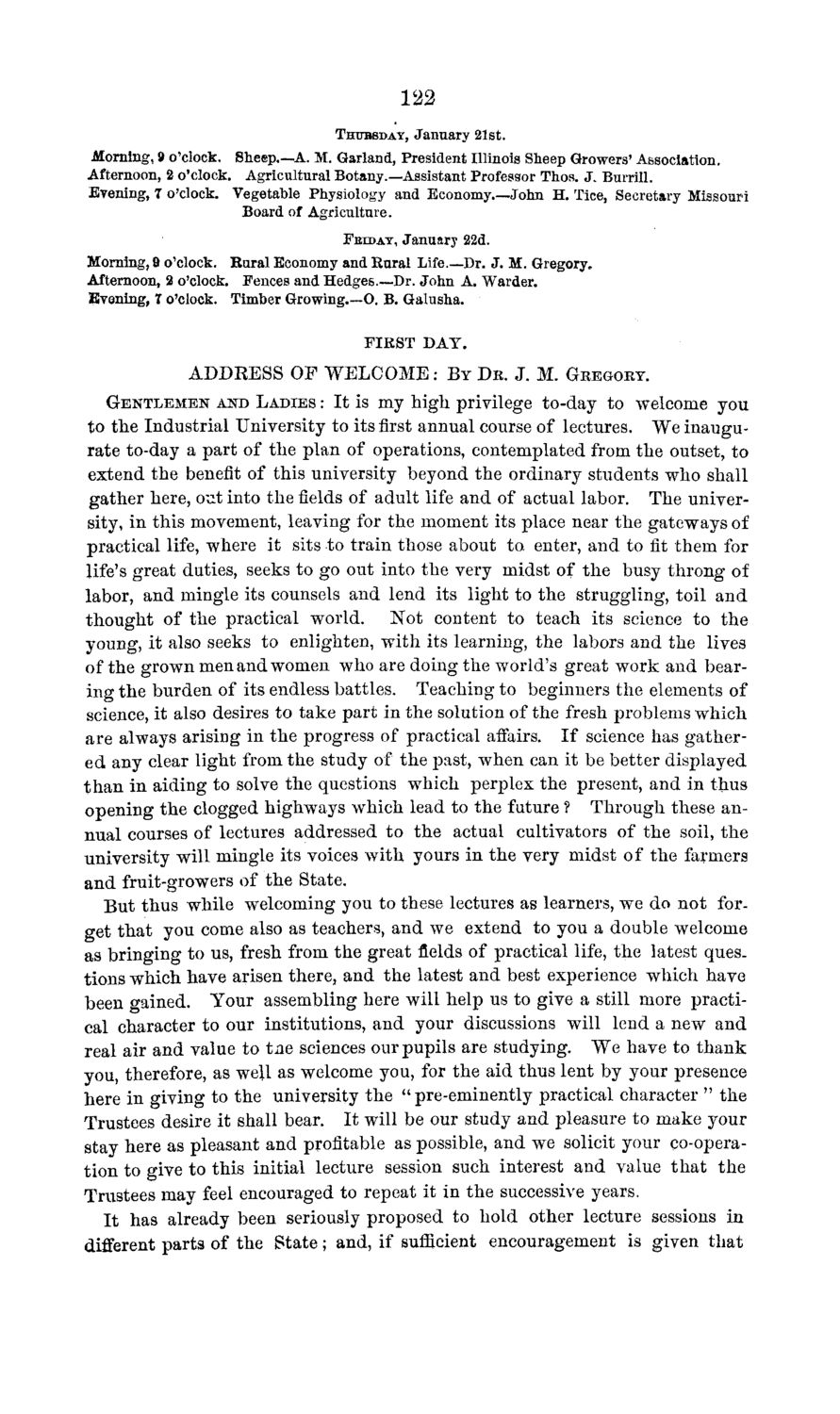| |
| |
Caption: Board of Trustees Minutes - 1869
This is a reduced-resolution page image for fast online browsing.

EXTRACTED TEXT FROM PAGE:
122 THUBSDAY, January 21st. Morning, 9 o'clock. Sheep.—A. M. Garland, President Illinois Sheep Growers' Association. Afternoon, 2 o'clock. Agricultural Botany.—Assistant Professor Thos. J. Burrill. Evening, 7 o'clock. Vegetable Physiology and Economy.—John H. Tice, Secretary Missouri Board of Agriculture. FEIDAY, January 22d. Morning, 9 o'clock. Rural Economy and Rural Life—Dr. J. M. Gregory, Afternoon, 2 o'clock. Fences and Hedges.—Dr. John A. Warder. Evening, 7 o'clock. Timber Growing.—O. B. Galusha. FIRST D A Y . A D D R E S S O F W E L C O M E : B Y D R . J. M. GREGORY. GENTLEMEN AND LADIES : I t is my high privilege to-day to welcome you to the Industrial University to its first annual course of lectures. We inaugurate to-day a part of the plan of operations, contemplated from the outset, to extend the benefit of this university beyond the ordinary students who shall gather here, out into the fields of adult life and of actual labor. The university, in this movement, leaving for the moment its place near the gateways of practical life, where it sits to train those about t o enter, and to fit them for life's great duties, seeks to go out into the very midst of t h e busy throng of labor, and mingle its counsels and lend its light to the struggling, toil and thought of the practical world. Not content to teach its science to the young, it also seeks to enlighten, with its learning, the labors and the lives of the grown men and women who are doing the world's great work and bearing the burden of its endless battles. Teaching to beginners the elements of science, it also desires to take part in the solution of the fresh problems which are always arising in the progress of practical affairs. If science has gathered any clear light from the study of the past, when can it be better displayed t h a n in aiding to solve the questions which perplex the present, and in thus opening the clogged highways which lead to the future ? Through these annual courses of lectures addressed to the actual cultivators of the soil, the university will mingle its voices with yours in the very midst of the farmers and fruit-growers of the State. But thus while welcoming you to these lectures as learners, we do not forget that you come also as teachers, and we extend to you a double welcome as bringing to us, fresh from the great fields of practical life, the latest questions which have arisen there, and the latest and best experience which have been gained. Your assembling here will help us to give a still more practical character to our institutions, and your discussions will lend a new and real air and value to t n e sciences our pupils are studying. W e have to t h a n k you, therefore, as well as welcome you, for the aid thus lent by your presence here in giving to the university the "pre-eminently practical character " the Trustees desire it shall bear. I t will be our study and pleasure to make your stay here as pleasant and profitable as possible, and we solicit your co-operation to give to this initial lecture session such interest and value t h a t the Trustees may feel encouraged to repeat it in the successive years. I t has already been seriously proposed to hold other lecture sessions in different parts of the S t a t e ; and, if sufficient encouragement is given that
| |